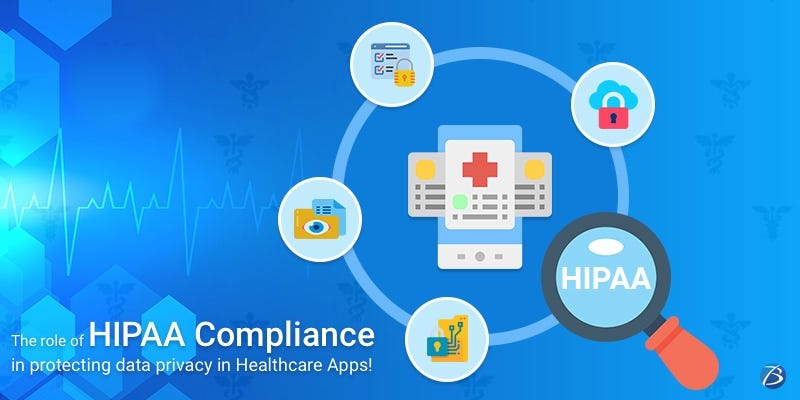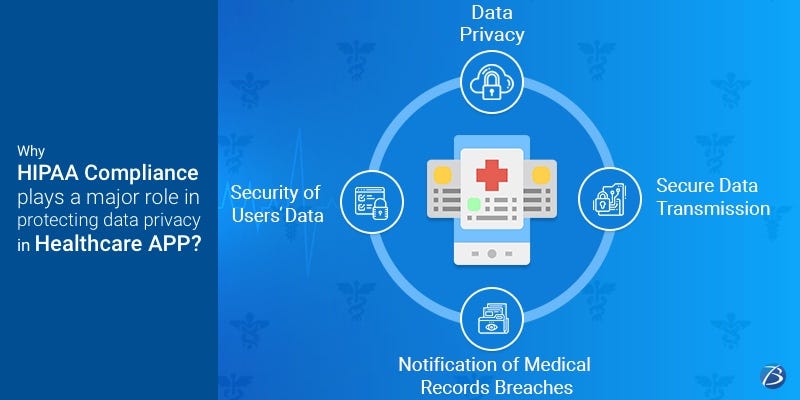
The modern era of digitalization has brought about transformative changes in the healthcare sector. Global spending on healthcare services is on the rise, a bright future awaits this industry for sure! Healthcare service providers are hiring Healthcare App Development Companies and leveraging advanced technologies to deliver premium-quality services to their patients. Advanced healthcare mobility solutions are helping the users to actively track their basic health statistics like tracking their heart rate, checking their blood glucose/ BMI level, avail online doctor consultation services via the app, appointment booking, etc. Moreover, both patients and practitioners can access electronic Health Records whenever required.
But, despite the convenience quotient of using digital healthcare services via an app, data security happens to be one of the greatest concerns of the healthcare industry. These medical apps are susceptible to data breaches, hacking, cyber-attacks, etc. which can pose a risk to the sensitive medical data of patients, causing massive losses to medical facilities. Therefore, healthcare organizations should be more vigilant of their software and cyber-security practices. For avoiding theft, misuse, and fraud of the patients’ data, all healthcare applications in the US have to be HIPAA compliant and strictly adhere to the HIPAA rules and regulations.
What is HIPAA?
HIPAA refers to the Health Insurance Portability and Accountability Act and is issued by federal regulators. This Act mandates a set of safety and privacy standards to protect the confidentiality and availability of medical records and sensitive patient information. Initially, the purpose of introducing this act was to improve the efficiency and effectiveness of the medical organizations in the U.S. With time, several rules were added to the Act to protect the individually identifiable health information commonly known as Protected Health Information (PHI). These rules influence the functioning and security protocol of healthcare mobile applications.
The entities covered under the HIPAA Act are health plans, healthcare clearinghouses, and healthcare providers that use electronic media for transmitting data such as health claims, coordination of benefits, referral authorizations, etc. These entities may comprise small/large organizations, institutions, research centers, individual practitioners, and even government agencies.
How HIPAA Compliance plays a major role in protecting data privacy in Healthcare Apps?
Adhering to HIPAA for data privacy is federally mandated for healthcare facilities and other healthcare IT service providers such as healthcare mobile app development services and mHealth development services. So, let’s understand why HIPAA compliance plays a major role in protecting data privacy in Healthcare Applications.

Data Privacy
The importance of capturing data has risen over the years to improve the overall healthcare operations, using advanced technologies like the Internet of Things (IoT), Robotic Process Automation (RPA), etc. The personal information of patients, their contact details, and medical reports are recorded and saved digitally by several hospital bodies. As such, maintaining data privacy is important to ensure that only the relevant information is shared with the right set of people and at the proper time. This strategy helps providers to build trust amongst the patients.
HIPAA compliant apps abide by strict rules to ensure data security and privacy. These apps are hosted on HIPAA-compliant servers to ensure that all the HIPAA standards are fulfilled correctly. They have to display a link in the privacy policy of the mobile app, while the users download the app. The apps take consent from the patients/users before storing their information. Furthermore, the users are informed about how their data will be used.
Security of the healthcare data
Data breaches can lead to disastrous consequences for patients, hospitals as well as healthcare facilities. Fraudulent insurance claims, extortion, or identity thefts are likely, and once this data is hacked/lost, it can be devastating for both patients and medical providers. So, it is essential to secure the data of patients, the hospital workforce, or other back-office data.
A HIPAA compliant mobile app solution ensures the safety and privacy of healthcare data. The medical app users can access the data only through a secure login procedure. Additionally, two-factor authentications are applied for more security and all data presented in the app can be only accessed using a secure PHI key. Besides, in case the mobile device is lost or stolen, personal user information cannot be accessed easily owing to the advanced security standards and encryption. Data stored on database servers are also encrypted to prevent easy access to healthcare data.
Secure transmission of data
In many large Healthcare Organizations with multiple branches, the medical data needs to be shared with several doctors or concerned authorities. If such hospitals use a mobile app for data transmission, it must be as per HIPAA rules and regulations. Moreover, hospital bodies should audit data from time to time for ensuring that the user data in the app isn’t accessed inappropriately or modified abruptly. Furthermore, in the case of remote monitoring of patients using wearable technology, like IoT or AI; only the required data will be transferred to ensure the security of data. For this reason, the communication networks of the apps possess integrity control mechanisms.
A HIPAA compliant app ensures that the amount of sensitive data stored in them has access limitations when the device is carried outside the hospital premises. Additionally, when users delete these apps, any related health data is deleted completely from their device. Remember that HIPAA laws apply only to the apps using PHI i.e. protected health information. Therefore, the data transferred from an app that does not deal with personally identifiable information need not be protected under HIPAA guidelines.
Notification of healthcare records breaches
Today, there is a high possibility of sensitive Healthcare data getting fraudulently accessed by hackers. However, if the Healthcare app is HIPAA compliant, it needs to notify affected individuals about the breach of data without unreasonable delay and this notification should not be sent later than 60 days. This policy is mandatory for all apps that are adhering to HIPAA to abide by data breach notification laws. As per these laws, eligible data breaches are obliged to alert the users or relevant parties.
Some of the data breaches may not cause serious repercussions to medical facilities. In case any disclosure of information, unauthorized access to it, or loss of personal information is bound to cause serious damage, then such breaches are known as eligible data breaches. They can cause financial losses or even damage the reputation of the medical organization. So, the mobile app they employ should be HIPAA compliant and should send prompt notifications to users.
Key Takeaways:
Today, data is the biggest asset for any industry vertical, and healthcare bodies are no exception to it. Today, most hospitals implement diverse innovative digital technologies to deliver improved services to their patients. However, the medical data handled by apps are vulnerable to security and privacy threats. In order to protect this data, these digital healthcare apps must follow the HIPAA guidelines. As per HIPAA compliance, the covered entities need to administer physical, technical as well as administrative safeguards for PHI in place for ensuring privacy, integrity, confidentiality, and security of healthcare data.
To know more about our core technologies, refer to links below:

